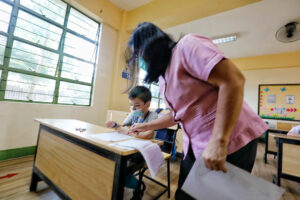Overseas teacher training urged to address skills gap in STEM

By John Victor D. Ordoñez, Reporter
THE GOVERNMENT needs to sponsor overseas training programs for teachers to bridge the proficiency and learning gap in the Science, Technology, Engineering, and Mathematics (STEM) fields, a legislator said.
“I think times are changing and we have to (be familiar with upcoming) technology; we have to learn with that so we can have a better future,” Isabela Rep. Faustino Michael Carlos T. Dy III told BusinessWorld on the sidelines of a youth upskilling summit organized by the United States Agency for International Development (USAID) and the Philippine Business for Education (PBEd).
“We have to reevaluate our teachers’ educational programs; maybe we need more seminars abroad for them to learn new concepts,” he added.
In a July report, the Asian Development Bank (ADB) said the Philippines should use education technology to bridge the skills gap or risk job losses due to rapid technological advancement.
During Wednesday’s summit held at the Sofitel Philippine Plaza in Pasay City, USAID Office of Education Director Thomas Leblanc urged private sector representatives and officials from the Departments of Labor and Employment (DoLE) and Trade and Industry (DTI) to implement more upskilling programs for out-of-school youth.
The USAID’s Opportunity 2.0 program, which was started in 2020, helped over 37,000 youth land jobs through financial literacy and skills training programs, it said in a statement on Wednesday.
Rosanna A. Urdaneta, deputy director general for policy and planning of the Technical Skills and Development Authority (TESDA), said TESDA and DoLE will work with USAID in developing entrepreneurial workshops and agricultural training and livelihood programs for out-of-school youth.
“We are hoping for a continued harmonious collaboration with the private sector to be able to elevate the quality of education and contribute to the development of globally competitive Filipinos,” she said.
Meanwhile, USAID on Thursday signed an agreement on enhancing policy research and capacity building in the education sector with the Second Congressional Commission on Education (EDCOM II), which is composed of Philippine congressmen and senators.
Students in the Philippines and Indonesia are more than a year behind in their learning because of the coronavirus pandemic, McKinsey & Co. said in a report published in April 2022.
The ADB estimates that 21% of children from middle-income countries who are of school age by 2030 will not learn basic primary-level skills.
International Labour Organization (ILO) Director-General Gilbert F. Houngbo has urged the government and employers to boost investment in education and to equip teachers with modern skills to address youth unemployment.
Under the proposed 2024 national budget, education will get P924.7 billion, 3.3% higher than this year.
“Education is about continuous learning and teachers need to adapt to effectively transfer knowledge to our kids,” Mr. Dy said.




